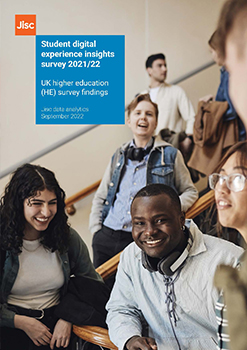Student digital experience insights survey 2021/22: higher education findings
Between November 2021 and April 2022 we surveyed 33,726 students from 41 UK universities and colleges delivering higher education.

Learning from past experiences to build a stronger future
The time when all learning had to be online has thankfully passed and students are once again able to engage with lecturers and peers face-to-face and to take advantage of campus facilities. The pandemic meant that, for a while, everyone was forced to participate online and so most students have experienced at least some elements of digital learning and are more aware of the potential benefits and pitfalls. Many can now see the valuable role that technology can play in their learning experience and would miss it if it were no longer available.
Returning exclusively to pre-pandemic practices is not an option. But we need to listen to the student voices, acknowledge their experiences, both good and bad, and work together to build a stronger, more blended future – one that uses technology to provide authentic, flexible and interactive learning opportunities that equip students for their chosen careers.
Key findings
- Students want blended learning – 45% of students who responded to our survey expressed a preference for a mix of onsite and online learning, not surprising given that 71% were learning from home
- Students perceive that what is currently on offer is of a good standard – 74% rated the quality of online learning on their course as above average
- Student involvement in decisions about their digital experience brings many benefits and there is clearly a willingness from this year’s survey respondents to get engaged with 37% saying they were given the chance to be involved in decisions about learning platforms
- Issues around digital and data poverty remain – 63% of respondents experienced one or more problems when learning online and 51% reported having poor wifi connection. Only 9% were either given or loaned devices or received help to buy equipment that would have supported their learning
- Student perceptions about how engaging and motivating their learning materials were low with just 43% agreeing they were so – highlighting the need for careful consideration of curriculum design
The full report gives a detailed analysis of our findings and guidance on how universities can address the issues raised.
About the authors

I work in the business intelligence unit at Jisc, primarily on the digital experience insights surveys for students, academic staff and professional services staff. The focus is on supporting members across further and higher education to enrich their student experiences by providing powerful data to inform strategic planning and investment.